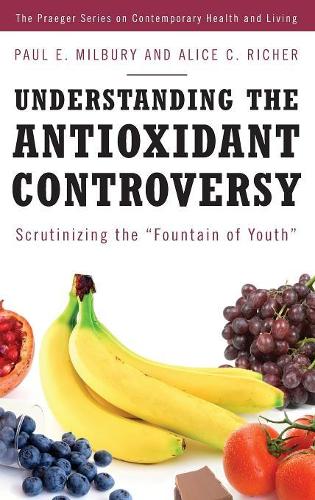
Understanding the Antioxidant Controversy: Scrutinizing the Fountain of Youth
(Hardback)
Publishing Details
Understanding the Antioxidant Controversy: Scrutinizing the Fountain of Youth
By (Author) Paul E. Milbury
By (author) Alice C. Richer
Bloomsbury Publishing PLC
Praeger Publishers Inc
30th November 2007
United States
Classifications
General
Non Fiction
Dietetics and nutrition
613.28
Winner of 2008 Will Solimene Award for Excellence in Medical Communication 2007
Physical Properties
Hardback
192
Width 156mm, Height 235mm
454g
Description
Current scientific evidence suggests that free radicals unstable by-products produced by normal human metabolic processesdamage the body, resulting in chronic health disorders and degenerative changes associated with aging. Nutritional products on the market today promise antioxidants can reducepossibly even reversedamage caused by these free radicals. If true, that would mean less chronic disease and premature aging, at the very least. But are antioxidants indeed the new Fountain of Youth Media reports extol antioxidants as the solution to disease and aging, and some studies do seem to back up those reports. Yet the studies that have been completed are far from conclusive, and taking antioxidant supplements can be dangerous. This book explores current thinking, analyzes studies, and answers the questions: What are antioxidants What do they do Is there any real benefit to taking them as supplements Are there real dangers for me Media report preliminary and conflicting scientific studies on antioxidants, notwithstanding the fact that the final analysis about their effectiveness and safety is incomplete. The result is increasing sales of dietary supplements and so-called functional foods or nutraceuticals that are not regulated, nor proven, and a possible public safety crisis from hypersupplementation. Milbury and Richer bring us up to date, sharing nuances and emerging news regarding antioxidantsand their dangers. Understanding the Antioxidant Controversy is an educated consumers' and health professionals' guide to this controversial topic.
Reviews
Packed with information, this slim volume places the subject of antioxidants in a broader context. Early chapters provide detailed, well-referenced discussions of dietary supplement and nutrition topics, including scientific history, regulatory and legal aspects, and epidemiology. Research scientist Milbury (Tufts) and dietitian Richer (Spaulding Rehabilitation Hospital, MA) then describe the oxidation process. Readers will need some background in chemistry to follow this section, which quickly becomes quite complex. Having explained the vast size and controversies of antioxidant research, the authors summarize the most important findings. Recommendations follow for many popular supplements, including vitamins C and E, carotenoids, flavonoids, and selenium. Extensive tables compare current dietary guidelines. Supplementing the text are diagrams, a glossary, a recommended Web sites list, and hundreds of references. Although many books deal with antioxidant supplements, the majority are written for a general audience and do not address the science, history, and regulatory issues.Highly recommended. Lower-level undergraduates through health professionals; researchers from various disciplines. * Choice *
Author Bio
Paul E. Milbury is a Scientist at the Jean Mayer USDA Human Nutrition Research Center on Aging at Tufts University. His work is focused on determining dietary antioxidant bioavailability and effectiveness of nutrients in treating aging related disorders. Before joining Tufts, Milbury was a Harvard Research Fellow at Massachusetts General Hospital studying oxidative stress in neurodegenerative disorders. He also served an 8-year tenure in the Long Range Research Lab at ESA, Inc., involved in a study of degenerative disorders funded by National Institute of Aging grants. Milbury holds a Ph.D. in Animal and Nutrition Science, and degrees in Animal Science, Cell Biology, and Chemistry, all from the University of New Hampshire. Alice C. Richer is a Registered, Licensed Dietician who has practiced in therapeutic, administrative, and education settings for more than 25 years. She is currently a Consultant for nursing homes and an employee at Spaulding Rehabilitation Hospital Framingham Center, where she works with post-polio survivors, breast cancer survivors, and the professional soccer team, the New England Revolution. She trained at Beth Israel Hospital and earned her degrees at the University of Rhode Island and Boston College.
